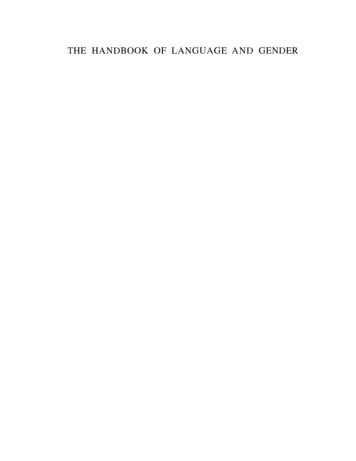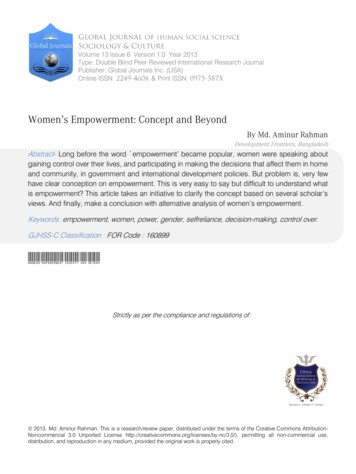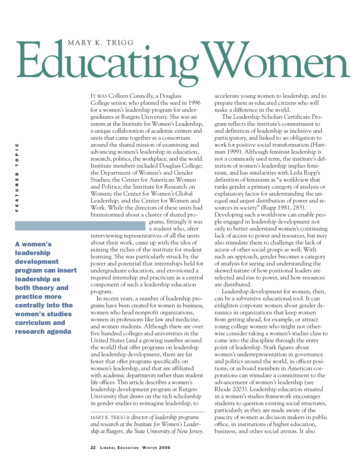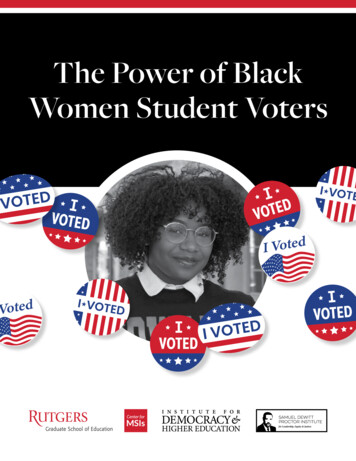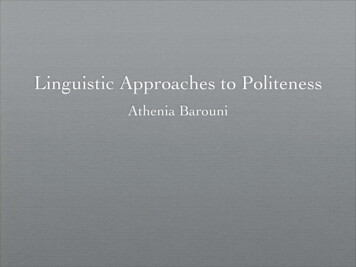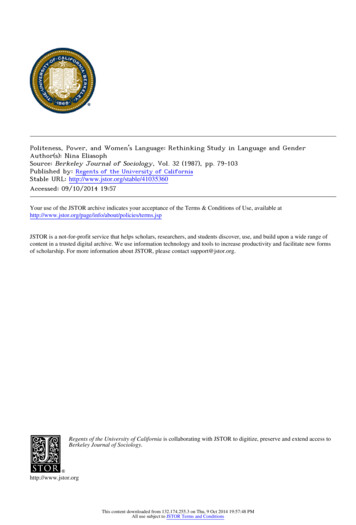
Transcription
Politeness, Power, and Women's Language: Rethinking Study in Language and GenderAuthor(s): Nina EliasophSource: Berkeley Journal of Sociology, Vol. 32 (1987), pp. 79-103Published by: Regents of the University of CaliforniaStable URL: http://www.jstor.org/stable/41035360 .Accessed: 09/10/2014 19:57Your use of the JSTOR archive indicates your acceptance of the Terms & Conditions of Use, available at ms.jsp.JSTOR is a not-for-profit service that helps scholars, researchers, and students discover, use, and build upon a wide range ofcontent in a trusted digital archive. We use information technology and tools to increase productivity and facilitate new formsof scholarship. For more information about JSTOR, please contact support@jstor.org.Regents of the University of California is collaborating with JSTOR to digitize, preserve and extend access toBerkeley Journal of Sociology.http://www.jstor.orgThis content downloaded from 132.174.255.3 on Thu, 9 Oct 2014 19:57:48 PMAll use subject to JSTOR Terms and Conditions
Politeness,Power,and Women'sLanguage:Studyin Languageand Gender*RethinkingBy Nina EliasophHundredsof empiricalstudiesin the past severalyearshavetheexistenceof genderinequalitiesin languageuse. Thedocumentedstudieshave also generatedpuzzlinganomalies. rs,use particularlinguisticthanmen,and sometimesmen use themmorethanwomen. Somethese linguisticfeaturesas signs oftimesthe researchersinterpretifespecially theyare featuresof women'sspeech,andpowerlessness,sometimestheysee these as signsof power,especiallyif theyarefeaturesof men's speech.By viewingthesedata froma theoreticaltheseperhapsI can suggesta new wayof s.I wouldliketo groundthisresearchin twotheoreticalOne perspectivederivesfromthe worksof ErvingGoffman(1961;powerdoes not inherein anyparticularaction1979). For Goffman,in itself. Rather,an act acquires meaningonly as a "move" in aof anygivenlanguage"game." Beforeaddressingthe "powerfulness"withinwhichlinguisticfeaturewe shoulddeterminegame thismoveisbeingplayed. My firstset of questions,then,seeks to clarifywhat"powerful"languagemeans: languagemovesthatin one game commandpowermayin another"game" appearfeeble. Differentgameskindsof power;and somekindsof powermightbeallowfordifferentmoreagreeableto womenthanto men.The second theoreticalperspectivethroughwhichI view thisresearchis the recentgenderscholarshipof NancyChodorow(1974;could pro1978),Carol Gilligan(1982), and others.This perspectivevide a way of seeingwhatthe differencemightbe betweenwomen'sand men's "games." I look throughthe lens of these "differencefact that men and women talkfeminists"at the well-documentedin same-sexgroups. Previousresearchhas hung all ofdifferentlythesedifferenceson the peg of women'sassumedpowerlessness.Iin men's and women'satthatleastsome of the differencessuggestorientaspeechcan be seenas choices,based on thegenders'differentindividuationandtions to personalseparatenessand attachment,* ationThis content downloaded from 132.174.255.3 on Thu, 9 Oct 2014 19:57:48 PMAll use subject to JSTOR Terms and Conditions
80BERKELEY JOURNAL OF SOCIOLOGYfeminists"describe. Fromthisperspecempathy,as the "differencetive, it seems clear that womenand men would look fordifferentthingsin theirlinguisticgames. Whereaswomen mightbe morein emphasizingtheirconnectionto each other,menwouldinterestedin assertingtheirautonomy.For a related,thoughbe moreinterestedfeministapproach to the issue of the genders'differentdifferent,I referto nedLike the psychoanalyticallyshe also observesthatbased feminists,as enmeshedin awomenare morelikelythanmento see themselvescontext;men morelikelyto asserttheirseparationfromany particular context,morelikelyto believetheycan finda pointof viewoutside of themselves. For Smith, the differencecomes from thedifferentplaces women and men occupy in the divisionof labor.Women'sworktypicallyservesto anchorthe more abstractedandworkof menin therealmof theconcreteworld,shedecontextualizedSmith'ssays. While I have questionsabout some of her premises,1contributionis usefulhere insofaras it allows fora critheoreticalandtique of the conventionsof public speech,in its impersonalitypretenseof universality.Her workmakesexplicitthe linkbetweenof typicalthe genders'differentdispositionsand the earchin theworkof the"differenceBy groundingists," I hope to categorizedifferentlanguagesituationsin termsoftheirabilityto accommodatetypicallyfemalespeech. Where thefeaturesof women'stalkare seen as "powerless,"perhapswe are inthe presenceof a context-a language"game"- skewedto accommodate and to givecredenceto male speech,sincethewaysmentalktoeach otherand the wayswomentalkto each otherare different.Bylookingat the kinds of languageseen as appropriatefor a givenmixed-sexcontext,we can begin to understandthe accessibilityofvoices of men and women. That is, wethatcontextto the differentcan beginto see whatkindsof barriersinhibittypicalwomen'sconin a o lay thegroundworkThis theorizingwomenand menpaper,whichwould uncoverthe variousstrategiesuse to underminewhateverthe officiallanguageof a contextis andasserttheirown ways of speaking. Once I have determinedtheI can see how men andverbal predispositions,genders'differentin deas of how to talk in anyWomen and men have differentideas of whichgames are fun to play,and"game," have differenthave thereforedevoted theirpracticetime to differentgames. Ifmanagerialwork in a bureaucracyrequires a particularlymaleare less accesapproachto language,forexample,thenbureaucraciessible to women's voices than to men's. Yet the notion ofThis content downloaded from 132.174.255.3 on Thu, 9 Oct 2014 19:57:48 PMAll use subject to JSTOR Terms and Conditions
ELIASOPH: WOMEN'S LANGUAGE81bureaucracy,as Weber puts it, requires"a dischargeof businessaccordingto calculablerulesand 'withoutregardforpersons'."(1946:neutral215) A focuson the "game" could showhow the seeminglyconstructsbarriersto women's typicalbureaucracysystematicallyspeech,if the appropriatelanguagegamesplayedin the bureaucracyare usuallythe ones men like to play. The notionthatthe gamesthemselvesare not genderneutralchallengesthe ideas put forthbyas RosabethMoss Kanter,whosays:suchcorporatefeministsand theMy examinationof how formsof workorganization,of people withinthem,conceptionsof roles and distributionshape behavioral outcomes leave very few verifiable"sexin behaviorthatare not betterexplainedby rolesdifferences"and situationsand thus able to accountfor men's behavior,too.(1977: xiii)I suggestthat people come to such seeminglyneutralinstitutional languagesnot as clean slatesblanklywaitingto be inscribedwiththeinstitution'slinguisticrules,as Kanterwouldsay,but ratheras active and pre-socializedagents. It means a differentthingformen thanit meansforwomento play the "same" role,and even torules.followthe"same" linguisticlike bureaucraciesare not inShowinghow officialinstitutionsfact as "neutral"and universallyaccessibleas theypretendto beshould begin to dispel the ess.fact,thisapproachunderideologymobilityminesthe "statusattainment"model of social theory,whichmeasthesocial ingat the class,gender,or race,as a whole. Whilea fewwomenmay"rise,"our idea of whichdirectionis "up" is stilldefinedin a maleway.Discussingpowerthe way thisessay does takesthe individualout of thecenterof esin thelanguageacceptedin a context,anyfundasuffermentalchangemustoccurin the linguisticrelationsbetweengroupsof people ratherthan in the individual'sadjustmentto the e a eplay.The factthat languagesituationsare not genderneutralalsocalls intoquestionsome of thebasic ideas of Habermas(1977; 1984)and his followers.For Habermas,undistortedcommunicationis thekeyto democracy.An ideal speechsituationwouldbe one in whichsocial actorscould rationallydebatetheirideas in a publicsituation.Whilethisidea remainsappealing,moreattentionneedsto be paid tothegenderand class basis of anyspeechsituation.The implicitrulesa governinga disadvantage.This content downloaded from 132.174.255.3 on Thu, 9 Oct 2014 19:57:48 PMAll use subject to JSTOR Terms and Conditions
82BERKELEY JOURNALOF SOCIOLOGYof class 977; 1984; Heath, 1983) have also focusedon the role of languageon schooling,Bourdieuuse in perpetuatinginequality.Concentratingclassescome to schoolwithdifferentshowsthatmembersof differentmodes of expression,differentclass cultures,differentlanguages.Once in school though,the elite class's particularmode of culturalexpressionwins out over the others;the non-elitestudents'culturalformsare not recognizedby the educators,who do not breathethesame culturalair as theirlowerclass students.The teachersknowhow to decipheronly the expressionsof theirmore elite students,whiletheculturalformsof thelowerclassesremainan unchartedterritoryforthe school officials.Educators'devalorizationof mbolicdomination."of any one teacher,the eliteEven beyondthe specificpredilectionsas the "correct"ones. The dominantformsare institutionalizedclass'stypicalwaysof dressing,eating,speaking,in short,theirwaysof structuringIthattoshowBourdieu.somethingsimilar happenshopesaysbetweenthegenders.3linguisticbias is a firststep towardExposinginstitutionalizedchangingit. Whetheror not linguisticsubversionis possiblein allcontextsis not as immediatelyrelevantas is the consciousunderstandingthatthe rulesare skewedin favorof certaincategoriesofpeople. When playersbecome aware of the game as a whole,theyratherthan simplylettingresistanceperhapscan resistcollectively,way.eruptin a piecemeal,individual,untheorizedARE POWER AND POLITENESS MUTUALLY EXCLUSIVE?Robin Lakoffs important 1975 treatise, Language andWomen'sPlace, presentedwhatshe thoughtwerethe characteristicsof women'sspeechas displaysof powerlessness.Use of tagquestionsdon'ttheyl' qualifiers(e.g., women's(e.g., theyshow powerlessness,weak),excessivepoliteness,a specializedvocabularyspeechis awfullyto issue requestsrather(e.g., mauve, pinkingshears),a propensitythan commands,and a host of otherfeaturesmarked,in her eyes,women'sspeechas thespeechof an insecure,intimidatedgroup. Thepowerlessspeech,in turn,made peopletreatwomenas if theyreallywere powerless,whethertheywere or not. The firststudiesin thein language,then, investigateddifferencesarea of gender/powerwhetheror not womenreallydid speak in thesesupposedobviouslypowerlessways.were entirelyequivocal. For example,Thome,Their findingsKramarae,and Henleydiscussthe use of tag questionsin theiressay"Language, Gender, and Society: Opening a Second Decade ofResearch"(1983):This content downloaded from 132.174.255.3 on Thu, 9 Oct 2014 19:57:48 PMAll use subject to JSTOR Terms and Conditions
ELIASOPH: WOMEN'S LANGUAGE83Two studies-one of collegestudentsassignedto studygroups(McMillan et al, 1977) and the otherof heterosexualcouplesat home(Fishman,1980)-did . However,Baumann(1976) foundwomenand menused aboutthesamethatin a classroomsettingnumberof tag questions. Lapadat and Seesagai (1977) foundmenusedtwiceas manytagquesconversationsthatin informaltionsas women;Johnson(1980) foundin analyzingmeetingsofthatthe male leaderengineersand designersin a corporation,used the majorityof tag questionsand DuBois and Crouchin a professionalusedconference(1977) foundmenparticipants33 tag questions,whilewomenused none. It is hard to drawconclusionsfromall of this,exceptthatthe initialclaim wasphrasedtoo simply.(1983: 13)There were, in most of these studies, drastic differencesbetweenwomen'sand men's language,but not in all of the studies;foundwere not the same ones in eachand the drasticdifferenceswomen'stalk frommen's was interdistinguishedstudy. Whateverpretedas a sign of powerlessness.It would clearlybe impossible,from a man withoutthethen, for a woman to talk differentlyresearcher'sdevaluingher speech. The swarmsof "facts" whichhad "found" were buzzing around with no theoreticalresearcherssexistnestbut the one automaticallyprovidedby an unintentionallyideology.The data collectorsassumedthatfactsare discovered"outthere,"not generated(Kuhn, 1961; Feyerabend,1975) in the nestofone's theory.Whereno consciouslyarticulatedtheoryincubatedandslid in to do thejob.housedthe "facts,"the ideologyof patriarchy"What makes women's languagepowerless?"the originaltheoristsasked; not,"What kind of contextlets womenspeak in a way comfortableforthem?"I am assumingthatwomen'soppressionlies in thecomplicatedof psychologicaland structuralforcesand plain discrimiintersectionnation.A simplerapproachthan this,firstsuggestedby Lakoffandto tellwomenhowthenabsurdlysimplifiedby pop sociologiststryingto succeedin business,could use a contentanalysisapproach. Thesecould countthenumberof timesa womanuses a particuresearcherslar kindof wordor phraseand thensay,as Candace Westironicallythisapproach,"WhyCan't a WomanBeputsit in an essaycriticizingMore Like a Man?" (1982) Pop sociologistslike BettyLehan Harralikethewidelypropagated"dressforgan (1977) advocatedsomethingsuccess" theoryof the seventies,which claimed that if womendressedlike men, they,too, could be executives. Harraganurgeswomento play the game like men: "Come on, come on! You're nothouse.' You're in a ball game.If an opposingplayerdrops"playingthe ball, you pick it up and run." (1977: 138) Girls learn to bewomen by the games theyplay, games which leave ly"thattheyare typicalofThis content downloaded from 132.174.255.3 on Thu, 9 Oct 2014 19:57:48 PMAll use subject to JSTOR Terms and Conditions
84BERKELEY JOURNAL OF SOCIOLOGYreal-world"situations. In fact, she says, "girls' games.have nointrinsicvalue, theyteach nothing."(1977: 7) The pop sociologistsand Lakoff,too, focusedalmostexclusivelyon the women'spsycho"deficiencies."logicaland linguisticWestfocusesmuchmoreon the last of the forcesin the catedintersectionshe paysa greatdeal of attentionto theunequalstandardsappliedtomenand womentalkingin thesame waysin thesame kindsof situations. She compares,forexample,thenumberof timesa womananda man make a certainlinguistic"move," such as an interruption.WhiletheapproachI sketchin thisessaydoes entswhichmake contextsmore,orless, accessibleto women'sspeech. In otherwords,the problemofgenderinequalityin languageis overdetermined.West's work in particularforcefullyshows that we measurestandards.However,she doeswomen'sand men's talk by differentin thegenderorientationof the context.Inot focuson a differencewill focusnot on the language"moves," as West does, but on thegame in whichthe moves are being made. This poses a differentsetof facts.researchprogram,requiresan examinationof a differentA studythat began to move away fromthe skewedcontentanalysisapproach and toward an approach somewhatmore consonantwiththeone I am proposingwas PenelopeBrown'sinvestigationof politenessin a Mayanvillage. She asked,"Underwhatconditions and in what situationsdo women actuallyuse more politeexpressionsthan do men in comparablesituations? And why?"(1980: 117) Ratherthansimplycountingthe use in generalof someparticularword,syllable,or typeof phrase,she dividedspeechintowomen to women, men to men, andthree differentcontextsverbalstrategieswomenchoose inmixed-to comparethe differentsituations. Her "contexts"are not the same as mythe different"games,"sinceshe assumesthatvariousmovesmeantthesame thingfromone contextto another. However,attendingto differencesbetweenthe threecontextsshe namedwas a clearstepforwardfromthe approachthatimpliedthatwomen'slanguagewas some kindofruffleddressesin alike wearingflowered,bad femaleidiosyncrasy,serious,navyand beige bureaucracy.She explainedhow the use ofpolite languagewas functionalforthe women,sayingthatdifferentlevas strategiesto deal withdifferentlevelsof politenessfunctionedels of powerin the contextsshe studied. Her womenwereactivelytheirwaysthrougha patriarchalsociety,choosingpomaneuveringlitenessas a "disarming"strategyThis studyaskedquestionssimilarto myown,butwithimportantdifferences.Brownsaid womenhad to be politebecause theylacked power,but it could also be the case thatwomenhad moreThis content downloaded from 132.174.255.3 on Thu, 9 Oct 2014 19:57:48 PMAll use subject to JSTOR Terms and Conditions
ELIASOPH: WOMEN'S LANGUAGE85positivereasonsforchoosingpoliteness.If womenweremorepolitethan men in this village,Brownsaid, it must have been because"womenare moresensitivefrommomentto momentto thepotentialof whattheyare sayingand modifytheirspeechfacethreateningnesswas(1980: 93) She said omen'sinrelativelackofthedue, turn,powervillagesociety.Because of theirlack of powerand greatersocial distancefromtheircommunitiesin this patrilocalsociety,womenused theofpolitenessin theirrelationswithall people.strategyI wantto suggestan additionalinterpretationof thesame data.Maybe the Mayan women'sreasonsforspeakingthe waystheydidwereoverdetermined,both in the structureof patriarchalpower,asBrown showed, and in women's predispositionalorientationstowords,as I will tryto show. Maybe these two reasonsfeed eachotherin unexpectedways. My interpretationexplainsthe followingpuzzlinganomalyBrownfound. In the village,Brownsays,womenweregenerallymorepoliteto each otherin termsof whatshe calls"negativepoliteness"-hedging,apologizingfor imposing,minimizing. This did not make sense forher theory,whichsaw politenessonly as a strategyfor ially"face .She attributedthisseeminganomalyto smallsamplesize and thedifficultyof findingbetween"comparable"conversationswomenand womenand betweenmenand women.However,thisanomalymayactuallypointto an explanationofpolitenessrelatednot onlyto greateror lesseramountsof powerbutto a differentbrandof potentialpowerwhichwomenbroughtto asituation.Brownsays,if linguistic form differsin two styles it is because language isbeing used for differentends.only by probingbelow the surfaceand identifyingthe strategiesthat actors are pursuingwhen theyspeak can we see how the linguistic minutiae of utterancesarerelated to the plans of human actors." (1980: 117)The problemis, Browndid not devote enoughattentionto whatends." The earlierhypothesisonexactlydeterminesthe "differentlanguageand gender,as articulatedby Lakoff,saw men and womentryingto do the same thingswithwordsbut womenjust losingthewomengame. Here, Brownsaid that,because of powerdifferences,and menwerenot playingthegamewiththesame rules,but she stillassumedthattherewas only one game to play. It was onlypowerdifferencesthatforcedwomento use differentin thegame.strategiesI am suggestingthat women came to the playgroundalso withdifferentideas of whatgamesto play,so thattheyadjustedthe rulesnot onlybecause powerforcedthemto, but because the male gamedid notsatisfythem.This content downloaded from 132.174.255.3 on Thu, 9 Oct 2014 19:57:48 PMAll use subject to JSTOR Terms and Conditions
86BERKELEY JOURNAL OF SOCIOLOGYTherewas no singlestandard,no universalgame,but rather,ain thiscase, to the socialnumberof differentgamescorresponding,groupsBrownexamined. A parallelcan be drawnto the class am(suchas Morhavedescribed.andHall, 1973)Everyonemightnot beley, 1980;but mightbe des." A class, orstandards,usingdifferentaccordingto differentgender,wouldwin thegame,then,notby acceptinganotherclass' orgender'sscale,butby imposingitsown setof standards.The pointisnot who wins the game,but who getsto decide whatgame is beingplayed.in Brown'svillage,then,may have been betweenThe strugglekindsofdifferent"games" or ntoraccessiblewerethatpeople.more,less,powerThe apparentanomaly Brown found was that women talkingtowomenwere morepolitethan womentalkingto men. If we introduce a theoryof the"game,"thisanomalycan be explainedby seeingthatthe womenmay have been playinga differentgame whenthemen werenot around. Sometimes,althoughnot all the time,in thecompanyof men, the women had to adjust theirpolitenesslevelto speakin,or at leastto reaformto,closelyresembledmen's language.They were tryingto play the men's game. The rulesfortalk werein the differentcontextsbecause the affordedand thekindsof satisfactionTaking the characterof the game into account,it becomeseasierto explaina numberof otheranomaliesin thedata. The firstproblemit explainsis one I describedearlier: women'sand men'sand sometimesnot. Bydifferenttalk is sometimessystematicallywhatkindsof accessto men'skindsofcontextsatwhatyieldlookingand women'svoices,we can see thatthe differentcontexts,yieldingkindsof power,resultin a wholerangeof differentdifferentpossiblethe inguisticdevicessuchasvalenceof a context,thenwe can look at thestrategictag questionsand qualifiersthatwomenand men use in the variouscontexts."moves" mean differentcases. Differentthingsin differentThe strategiesare, to continueGoffman'simage,movesin games.Thereare a varietyof languagegamesplayedin a society,and whilethevarietiesof languagesclearlydo notswingonlyon a genderhinge,this is one obviouslycrucialvalence in the divisionof powerandinteractionalstyles.DOCUMENTING THE DIFFERENCESof some more articlesonThe followingwill be a re-readingwomenand languagein lightof this idea, both to clarifyit and toThis content downloaded from 132.174.255.3 on Thu, 9 Oct 2014 19:57:48 PMAll use subject to JSTOR Terms and Conditions
ELIASOPH: WOMEN'S LANGUAGE87documentits possiblevalidity.The researchpointsto a moreovertlycooperativenatureof a women'sgame. Women'sgames,theresearchshows, typicallydo not acknowledgehaving winnersand losers.Womenwill be morelikelyto play down theirindividual,separateto spotlightthe harmonyof thegroup. Men will ,more likelywantlikelytryotherpeoplein thegroupto see theirseparateness.A studyon the relationbetweenexpertiseand gendershowedthateven whena womanis an experton a topic,she will not lordthisover a non-expertman,but a male expertwill dominatediscussions withnon-experts."Whereasthe name of man's game appearsto be 'Have I won?', the name of woman's game is 'Have I been1979: 212) Some eave a space forthe expertto flauntknowledge,I would add, andwherethereis no flamboyantominoussilencedisplayof knowledge,is heard,perhapssignifyinglack of expertiseto the non-expert.Tothe expertmay have to make of show ofbe seen as knowledgeable,expertise,but, as the studyshows,women are less likelyto be asin thatkindof struttinginterestedthanmengenerallyare.Treichler and Kramarae (1983) discussed the differencesbetweenmen's and women'stalk in academia. They cite a numberof studiesshowingthatwoman-to-womanspeechwas based on supportand "collaborativebuilding":itselfin such speechmarkersas a greateruse ofThis manifestspersonaland inclusivepronouns("you," "we") and phrases("let's," "shouldn'twe"); more ongoingreinforcement(headnods, mmhmms,etc.); more signsof interestin the formsoffor clarificationand concernthat allquestions,interruptionsgroupmembershave a chanceto speak; explicitacknowledgementof and responseto previousspeakers; utteranceswhichbuild upon or elaboratepreviousutterances;and the resolutionof conflictand competitionin directand 's interactionalstylewas morecompetitiveindividualized.In the late 1950s and early 1960s W. Edgar Vinackeand hisassociates (Vinacke, 1959; Bond and Vinacke, 1961; Uesugi andVinacke, 1963) devised games in which the three itheach other. An article (1963) co-authoredwith Thomas K. Uesugi showed that menformedcoalitionsonlywhentheybelievedit would help themwin.Women,however,"did not see the objectiveto be a matterof wina 'fair'outcome."(1961: 78)ningso muchas a problemof arrangingThe women'sgame-playingreflectedthisgoal. ndering"How could anyonemiss thepointthatthe objectiveof such a game is to win?" (1961: 80) TheThis content downloaded from 132.174.255.3 on Thu, 9 Oct 2014 19:57:48 PMAll use subject to JSTOR Terms and Conditions
88BERKELEY JOURNAL OF SOCIOLOGYwomenseemedto be playinga differentgame. In an admirablemovefortheera,theauthorsthenconfessed,"It occurredto us thatit (themasculinecharacter."game)had been designedto have an inherently(1961: 80) So theydesigneda new game4whichtheythoughtwouldbe moreappealingto women. In the new game,the men continuedto play in the same "exploitative"styletheyhad used previously.The women'sstylein the new game,however,changeddramatically,thantheone theyadoptedinto a styleeven more"accommodating"the originalgame. Further,the authorsnotedthat"muchthe samestraacts may have differentimplicationsas functionsof : 88) My hypothesesthe same move "means" gsin differentIn a finalarticleI will considerin thissection,MarjorieHarness Goodwin(1980) foundsimilardiscrepanciesbetweenthe waysgirlsand boys talkedwhiletheyplayedin same sex groups. Boys'groups'typicalstyleemployeddirectcommandsand insults,whilegirlsrarelyused thesetacticsin all-girlgroups.Further,she foundthatthe girlslearnedto talkwiththe boysin the boys' competitivetone and were perfectlycompetentat"speakingthe boys' language."The girls'avoidance of directcommands and insultswhen in all-girlgroupscould only be seen as achoice. These girlslived in a worldin whichthe "neutral"linguafrancawas male. They had, perhaps,less controlin the mixed-sexgroupthantheboysoverthetypeof languageused- overthetypeofgame played. Even thoughtheyalso mighthave been competentatspeakingtheboys'game,it was nottheirgame ofchoice.The researchof Goodwinand Vinackeand his associatesmightallay any fearsthat bothwomen and men changetheirspeech toadapt to cross-sexdiscussion;thatthegenders'languagesare equidistantto the third,cross-sexlanguage. Thoughwomenand men bothhave to changetheirlanguageto some extentin cross-sexinteracbetweenall-femaleand cross-sextions,thereare drasticdifferencesgroups,and only slim languagechangesfromall-male groupstomixedgroups,thestudiesdiscussedabove show.THEORETICAL DISCUSSION OF THE DIFFERENCESThe "girls' play" described by Goodwin, Vinacke, andKramaraeand Treichlercries out foran insightprovidedin CarolbetweenVoice(1982: 14). The similaritiesGilligan'sIn a Differentin playingstylesand theirher descriptionof gender differencesin languagestylesare striking.Folof ; 1978),Gilliganconnectsthesedifferencesboys' and girls' differentprocesses of separation from andidentificationwithparentsin the nuclearfamily.WithoutgoingintoThis content downloaded from 132.174.255.3 on Thu, 9 Oct 2014 19:57:48 PMAll use subject to JSTOR Terms and Conditions
ELIASOPH: WOMEN'S LANGUAGE89this alreadywidely known theoryany more than is relevanttoin verlanguageresearch,I thinkthatthisexplanationof differencesbal stylesshowsthattheyare notsimplydue to women'shavingbeenforcedinto "powerless"roles. Even in a powerfulrole,a woman'sTo translateto thegameanalidea ofwhatis powerwillbe different.arefunfordifferentreasons. We can learnthedifferentgamesogy,secondlanguage,but it is not the languageof our choice. Men areconmorelikelyto wantto displayfreedomfromany interpersonalstraints.Women,on the otherhand, will enmeshthemselvesin aparticularcontext,payingsuch carefulattentionto the needs of othersthattheymayevendenytheirown needsin theprocessof accommodatingothers'.(Orbach,1985)This does notmeanthatwomen'slanguagegamesare all sweetness and harmony. Controlin women's games will be exercisedfromcontrolin men's games,but that does not meandifferentlydominationwillbe absent,or controlwillalwaysbe morebenignin awomen'sgame. It just meansthatwe have to look at differentthingswhenwe look forcontrolin women'sgames.Just because men need to assert their separatenessin aninteractiondoes not mean that theyin factfeel more separateorin theirgames. Similarly,women'sgamescan exhibitauthoritativemore signs of cooperationwithoutalways in fact feelingmorecooperative.DorothyDinnerstein(1977) arguesthatboys and menneedto asserttheirdifferencefromtheirmothersin ordercontinuallyto asserttheirown maleness. Yet, she continues,thisdoes notmeanthatmen have simplygivenup theiridentificationwiththeirmothers. The repressedidentificationdoes notsimplydisappear. Extending Dinnerstein'sideas to languagestudy,we can see that men'sin orderto coverlanguagegamesmaymakea showof individualismoveranybasic senseof connection,aswomen'sjustgamesmaymakea show of cooperationto cover over any feelingof separateness.Bothfeelingscan be presentat once; thequestionis, whichkindsarelikelyrepressed?Women'sgameswill tendto mask the exerciseofindividualpower,while men's games will have more problemsexhibitingpersonalconnection.The ma
features of women's talk are seen as "powerless," perhaps we are in the presence of a context- a language "game"- skewed to accommo- date and to give credence to male speech, since the ways men talk to each other and the ways women talk to each other are different. By looking


